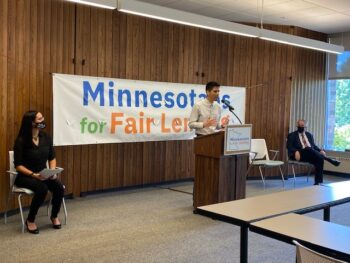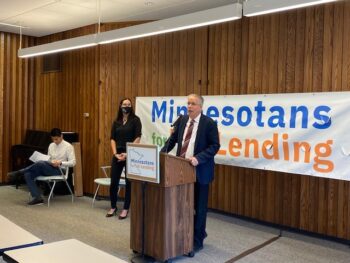By Kayla Zopfi

Eric Howard, executive assistant to Bishop Ann Svennungsen, speaks about polling of Minnesotans about their support for limited payday lending interest rates at a September 8 press conference.
On Wednesday, September 8, leaders from the Minnesota Council of Churches and the Minneapolis Area Synod, ELCA, released results from a recent poll conducted by Emerson College that demonstrates strong support for capping payday loans at 36% interest. The current average for the state is 208%, according to reports from the Minnesota Department of Commerce.
Emerson College interviewed 1,000 Minnesotans earlier this summer, including focused sampling from Blue Earth, Beltrami, St. Louis, Anoka, and Olmsted counties. More than 60% of Minnesotans believe that payday loans should be capped at 36%, and, of those who disagreed with the 36%, most believed that even that number is too high. The words most often associated with payday lending were “predatory,” “loan sharking,” “usury,” and “exploitative.”
“It’s clear that, overwhelmingly, Minnesotans are against payday lending, feel that it’s immoral, feel that it’s predatory, and feel that people should not have to turn to payday lending.”
“Over the years, I’ve met numerous Minnesotans who told stories of their experiences of being caught in the endless cycle of payday debt,” offered Eric Howard, executive assistant to the Bishop of the Minneapolis Area Synod. “The truth is, when payday lenders take advantage of people through unbelievably high interest rates and fees in their most vulnerable moments, people, families, and communities suffer.”
HOWARD, THE FORMER board president of Exodus Lending, an organization that offers an alternative to predatory payday loans, also stated, “The vast majority of Minnesotans — across all political parties — feel strongly that payday lending should be capped at 36%. And most who didn’t support that cap said it was because 36% was too high.” The Emerson College polling demonstrated that DFLers supported a cap at almost 83%, independents at almost 78%, and Republicans at more than 77%.

Minnesota Council of Churches CEO, the Rev. Dr. Curtiss DeYoung, shares his organization’s support for efforts to limit the debt trap that is payday loans, which, he highlights, is supported by the vast majority of Minnesota voters.
“It’s clear that, overwhelmingly, Minnesotans are against payday lending, feel that it’s immoral, feel that it’s predatory, and feel that people should not have to turn to payday lending,” added the Rev. Dr. Curtiss DeYoung, CEO of the Minnesota Council of Churches. “The interest rates are exorbitant and overwhelming. They add to the challenge of people being able to find the support that they need.”
“The Emerson College polling demonstrated that DFLers supported a cap at almost 83%, independents at almost 78%, and Republicans at more than 77%.”
“If credit card companies can survive well with an interest rate of 18 or 20%, it is unconscionable that some industries can prey off vulnerable working Minnesotans,” offered Brenda Blackhawk, congregational organizer for racial justice for the Minneapolis Area Synod. Blackhawk also pointed to the fact that some municipalities have begun to cap rates on payday loans, since the state legislature has failed to take unified action for Minnesotans. She said, “We will join with other legal, community, and consumer groups to stop the financial drain from working-class communities. We will work to make sure that the will of the people is carried out, and that Minnesotans are no longer tragically trapped in this unholy extortion of people’s paychecks.”
The Minnesotans for Fair Lending coalition is working on the issue of capping the payday loan interest rate in Minnesota. To engage in the push for economic equity, visit fairlendingmn.org. The Minneapolis Area Synod received a Bush Foundation grant to act as lead organization in the effort to protect consumers from predatory lending.
The press conference is available for viewing.
